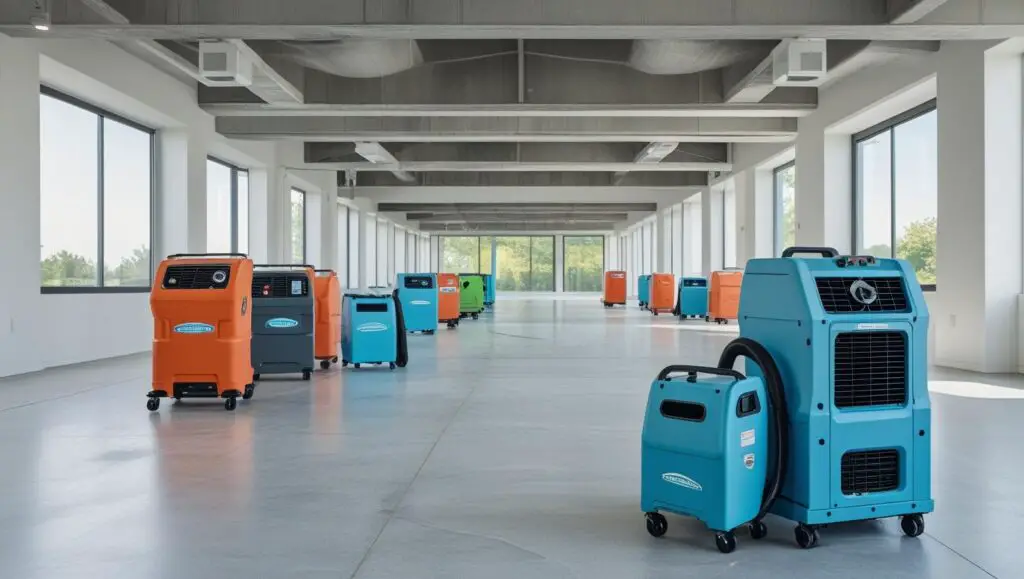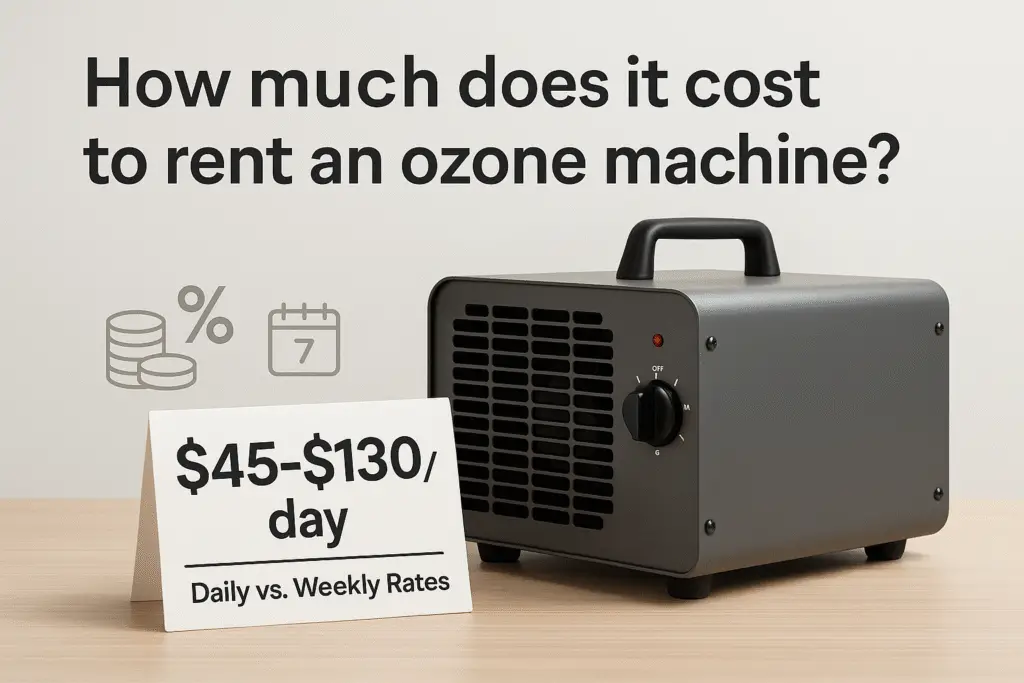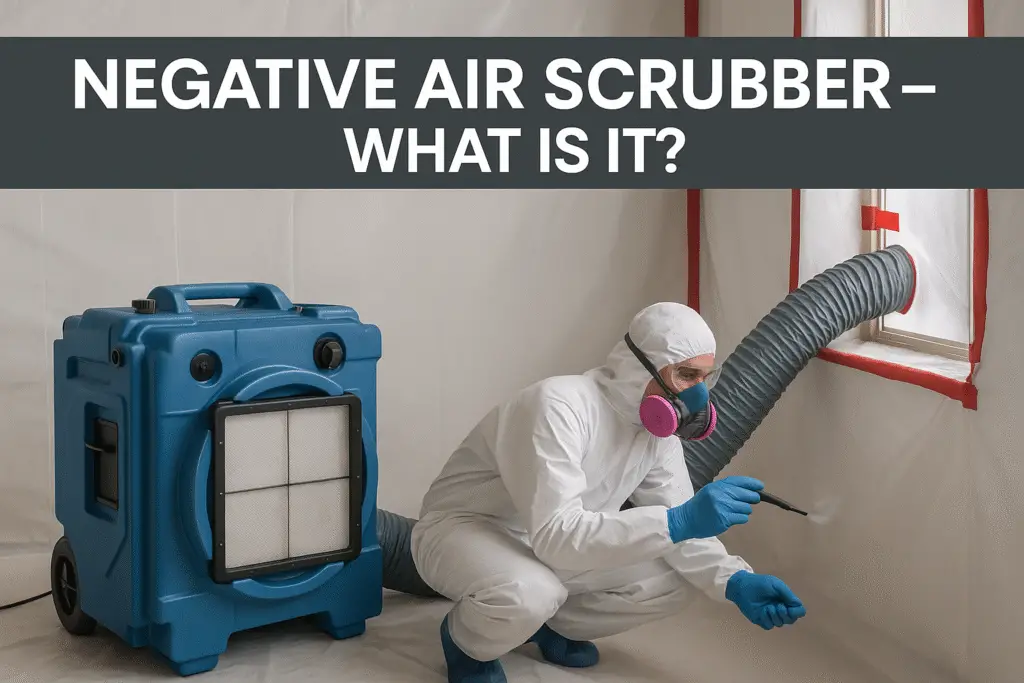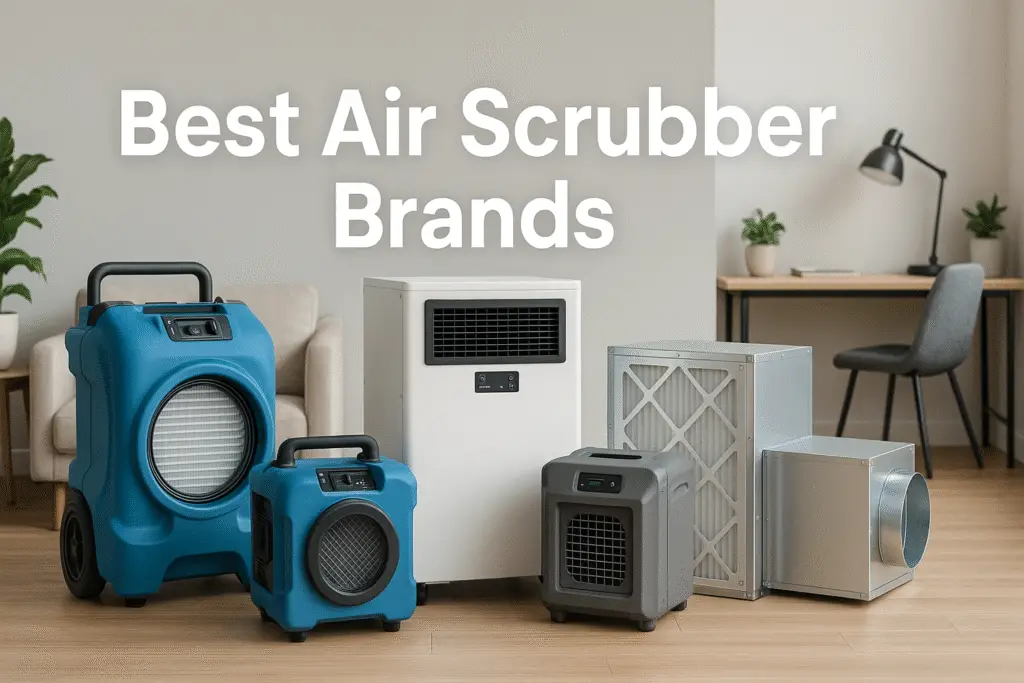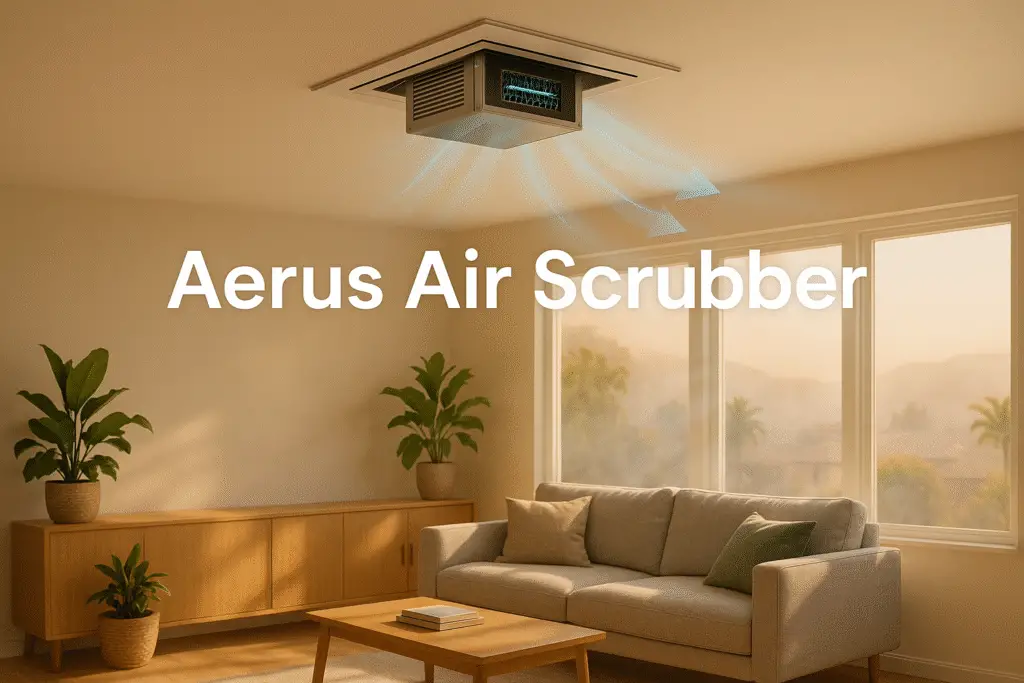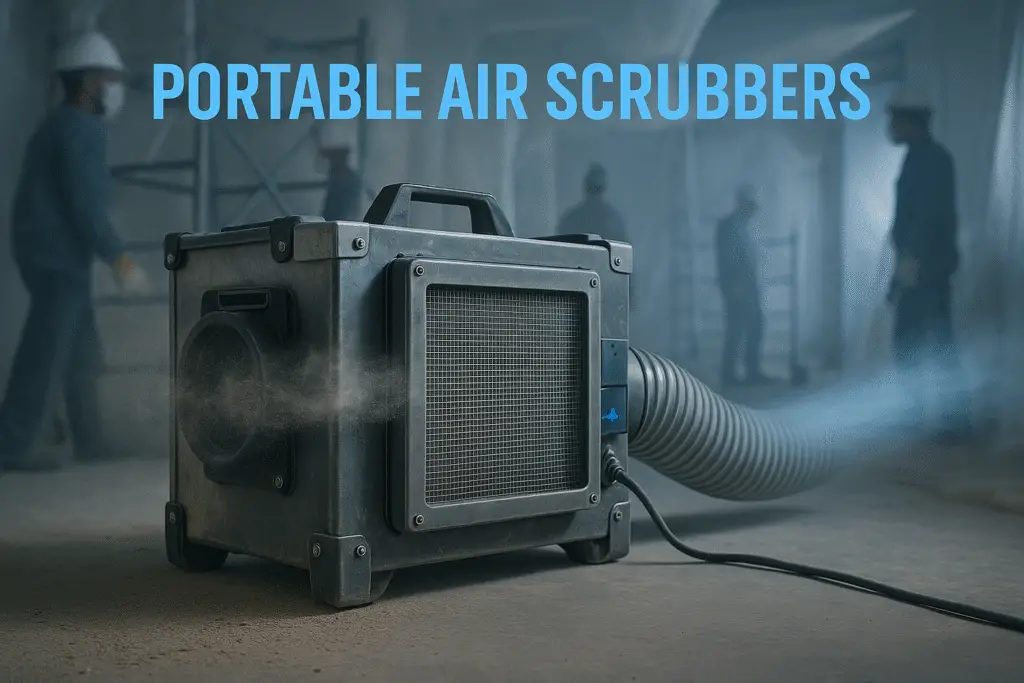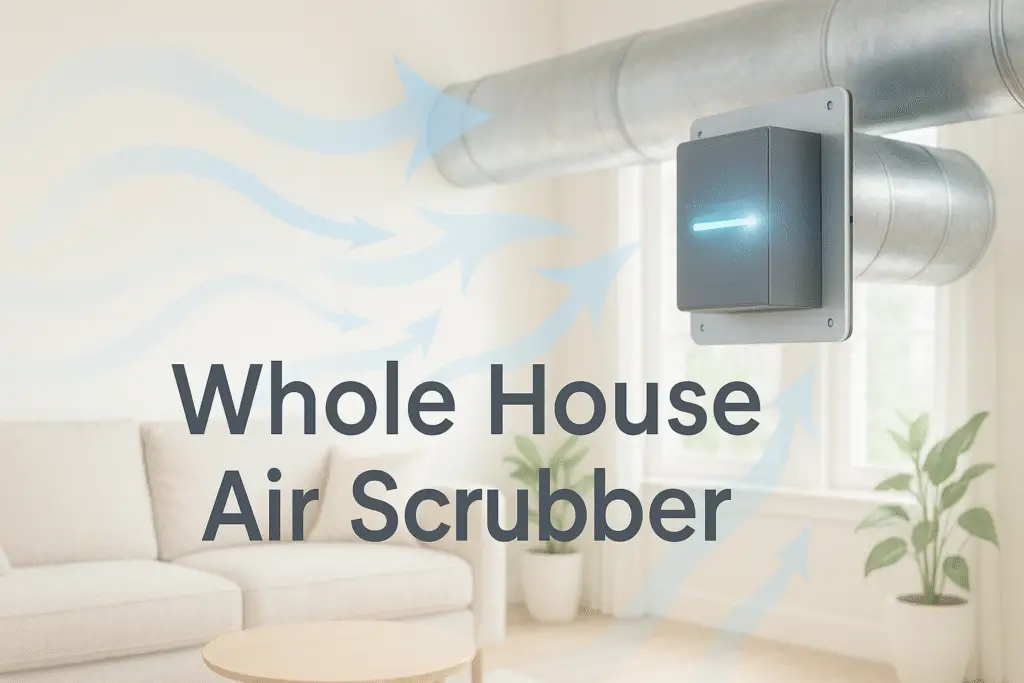The average cost to rent an air scrubber ranges from $75 to $300 per day or $225 to $900 per week depending on size, airflow capacity, and filtration level. For construction-grade HEPA air scrubbers, expect to pay $100-$250 daily, while industrial-grade negative air machines cost $150-$300 daily. Monthly rentals offer significant discounts, typically 50-60% less than daily rates when calculated per day.
Table of Contents
Average Air Scrubber Rental Costs by Time Period
Air scrubber rental costs vary based on rental duration, with significant discounts for longer rental periods. Here’s a breakdown of what you can expect to pay:
| Rental Period | Small (500-1,000 CFM) | Medium (1,000-1,500 CFM) | Large (1,500-2,000+ CFM) |
|---|---|---|---|
| Daily Rate | $75-$150 | $150-$250 | $250-$400 |
| Weekly Rate | $225-$450 | $450-$700 | $700-$1,100 |
| Monthly Rate | $600-$1,200 | $1,200-$2,000 | $2,000-$3,500 |
According to Sunbelt Rentals, a HEPA air scrubber with 500-1,000 CFM capacity costs approximately $85-$125 per day, while United Rentals offers similar models for $95-$140 daily. For industrial applications requiring larger units, Herc Rentals prices range from $175-$300 per day for 1,500+ CFM models.
Most rental companies offer significant discounts for weekly and monthly rentals. Weekly rates typically save 15-20% compared to daily rates, while monthly rentals can save 30-40% over daily rates when calculated per day.
Quick Answer: Daily vs. Weekly vs. Monthly Rental Value
For a standard 1,000 CFM air scrubber that costs $150/day, you’ll typically pay about $450/week (equivalent to $64/day) or $1,200/month (equivalent to $40/day). The longer your rental period, the more you save on daily costs.
Factors That Affect Air Scrubber Rental Pricing
The cost to rent an air scrubber is influenced by several key factors that can significantly impact your final price. Understanding these factors helps you budget accurately and avoid unexpected expenses.
Airflow Capacity (CFM Rating)
Airflow capacity, measured in Cubic Feet per Minute (CFM), is the primary factor affecting rental costs. Higher CFM ratings indicate the scrubber can clean more air volume per minute:
- 500-1,000 CFM units: Suitable for small rooms (up to 500 sq ft), cost $75-$150/day
- 1,000-1,500 CFM units: Ideal for medium spaces (500-1,000 sq ft), cost $150-$250/day
- 1,500-2,000+ CFM units: Designed for large areas or industrial use, cost $250-$400/day
According to restoration equipment specialists at Jon-Don, each additional 500 CFM typically adds $30-$50 to daily rental costs.
Filtration Levels and HEPA Requirements
The filtration system directly impacts both efficiency and rental cost:
- Basic filtration: Single-stage filters for dust and larger particles cost $75-$125/day
- Multi-stage filtration: 2-3 filter stages for construction debris and finer particles cost $100-$200/day
- HEPA filtration: 99.97% efficient for particles as small as 0.3 microns cost $150-$300/day
- Activated carbon: Additional odor removal capability adds $25-$50/day
HEPA filtration is required for mold remediation, asbestos, and lead abatement projects as mandated by EPA and OSHA regulations, which can increase costs by 25-40% compared to standard filtration units.
Equipment Age and Condition
Newer models with advanced features typically cost 15-30% more than older units but offer benefits like:
- Better energy efficiency (10-20% less power consumption)
- Digital monitoring and automated features
- Lower noise levels (65-70 dB vs. 75-85 dB for older models)
- Improved reliability and reduced risk of breakdowns
Some rental companies like Sunbelt Rentals and United Rentals categorize their equipment by age, offering different pricing tiers based on equipment condition and features.
Rental Duration and Scheduling
Longer rental periods offer significant discounts:
- Daily rentals: Highest per-day cost, best for 1-3 day projects
- Weekly rentals: 15-20% discount compared to daily rates
- Monthly rentals: 30-40% discount compared to daily rates
- Long-term rentals (3+ months): Can offer 40-60% discounts, often negotiable
According to rental industry data from the American Rental Association, scheduling during off-peak seasons (typically winter months) can reduce rental costs by 10-15% compared to peak construction seasons.
Location and Availability
Regional pricing variations can be significant:
- Major metropolitan areas (NYC, LA, Chicago): 15-25% higher than national average
- Rural areas: May be 10-20% lower but often have limited selection
- High-demand regions (disaster recovery areas): Can see 30-50% price increases
Local availability affects pricing too. If rental companies have limited inventory, prices may increase by 10-30% during high-demand periods.
Air Scrubber Types and Their Rental Costs
Different air scrubber types serve specific purposes and come with varying rental costs. Understanding these differences helps you select the right equipment for your project.
HEPA Air Scrubbers
HEPA (High-Efficiency Particulate Air) scrubbers capture 99.97% of particles as small as 0.3 microns, making them essential for sensitive environments.
- Daily rental: $100-$250 depending on size
- Weekly rental: $300-$700
- Monthly rental: $900-$2,100
- Primary uses: Mold remediation, asbestos abatement, medical facilities, and clean rooms
According to Mintie Technologies, HEPA filtration is required by law for certain remediation projects and adds approximately $25-$50 per day to standard air scrubber costs. Replacement HEPA filters (needed every 30-60 days of continuous use) cost $80-$200 each.
Negative Air Machines
Negative air machines create negative pressure in contained areas to prevent cross-contamination, commonly used in abatement and healthcare settings.
- Daily rental: $150-$300 for industrial-grade units
- Weekly rental: $450-$900
- Monthly rental: $1,350-$2,700
- Primary uses: Asbestos/lead abatement, hospital renovation, contamination control
Negative air machines typically include additional features like pressure monitoring and alarming systems, which increase costs by 20-30% compared to standard air scrubbers. According to Abatement Technologies, these machines require proper setup with sealed containment areas to function correctly.
Commercial and Construction Air Scrubbers
Standard construction-grade air scrubbers are designed for general dust control and air quality improvement on construction sites.
- Daily rental: $75-$200 depending on size
- Weekly rental: $225-$600
- Monthly rental: $675-$1,800
- Primary uses: Construction dust control, renovation projects, general air cleaning
These units often use washable pre-filters that can reduce operating costs over time. According to BuildClean manufacturer data, these units can capture up to 90% of airborne dust when properly positioned, making them suitable for most general construction applications.
Specialty Air Scrubbers
Specialty units designed for specific applications include activated carbon filtration for odor control or UV light systems for microbial treatment.
- Daily rental: $200-$400
- Weekly rental: $600-$1,200
- Monthly rental: $1,800-$3,600
- Primary uses: Fire/water damage restoration, chemical odor removal, healthcare settings
According to restoration industry data from the Restoration Industry Association, activated carbon filters add approximately $25-$75 per day to rental costs but are essential for projects involving smoke damage, chemical odors, or VOC removal.
| Air Scrubber Type | Daily Cost | Best For | Key Features |
|---|---|---|---|
| HEPA Air Scrubbers | $100-$250 | Mold remediation, asbestos abatement | 99.97% filtration efficiency, required for remediation |
| Negative Air Machines | $150-$300 | Containment areas, healthcare settings | Pressure monitoring, sealed operation |
| Commercial/Construction | $75-$200 | General construction, renovation | Durable design, washable pre-filters |
| Specialty (Carbon/UV) | $200-$400 | Fire/water damage, odor control | Activated carbon, UV light treatment |
Total Project Cost Considerations
When budgeting for an air scrubber rental, you need to account for several additional costs beyond the base rental rate. These factors can significantly impact your total project expense.
Filter Replacement Costs
Filter replacement is an essential ongoing cost that varies by scrubber type and environmental conditions:
- Pre-filters: $15-$40 each, typically replaced every 1-2 days in dusty environments
- Secondary filters: $40-$80 each, replaced every 5-7 days of continuous use
- HEPA filters: $80-$200 each, replaced every 30-60 days of continuous use
- Carbon filters: $50-$100 each, replaced every 5-10 days depending on odor levels
According to Sylvane, a leading air quality equipment distributor, filter replacement costs can add 15-25% to the total rental expense for projects longer than one week. Some rental companies include one set of filters in the base rental price, while others charge separately for all filter replacements.
Delivery, Setup, and Pickup Fees
Logistics costs can add significantly to your rental expense:
- Delivery fees: $50-$150 depending on distance and equipment size
- Pickup fees: $50-$150, sometimes waived if combined with delivery
- Rush delivery: Additional $75-$200 for same-day or next-day service
- Setup assistance: $75-$150 per hour for professional installation
According to United Rentals, delivery fees are typically calculated based on zone pricing, with locations within 10 miles costing less than those 30+ miles away. Some companies offer free delivery for rentals exceeding certain amounts (typically $500-$1,000).
Electricity Usage
Air scrubbers consume electricity continuously while operating:
- Small units (500-1,000 CFM): 1-2 amps, approximately 120-240 watts
- Medium units (1,000-1,500 CFM): 2-4 amps, approximately 240-480 watts
- Large units (1,500+ CFM): 5-8 amps, approximately 600-960 watts
Based on the national average electricity cost of $0.14 per kWh, operating costs range from $0.40-$3.25 per day depending on unit size and runtime. For continuous 24/7 operation over a month, this adds approximately $12-$97 to your project costs.
Additional Equipment Needs
Many projects require supplementary equipment:
- Ducting and hoses: $20-$50 per day for 25′ sections
- Containment materials: $100-$300 for plastic sheeting, tape, and zippers
- Pressure monitors: $25-$75 per day for digital manometers
- Extension cords: $10-$25 per day for heavy-duty cords
According to restoration experts at RestorationEze, proper containment setup can add $200-$500 to total project costs but is essential for effective negative air control and preventing cross-contamination.
Insurance and Damage Waiver Fees
Protecting yourself from potential equipment damage costs:
- Damage waivers: Typically 10-15% of the rental cost
- Security deposits: $200-$500, refundable upon undamaged return
- Liability insurance: May be required if not covered by existing business insurance
According to rental industry standards reported by the American Rental Association, damage waivers are optional but recommended, especially for inexperienced users or challenging environments.
Example Total Cost Calculation for a 1-Week Project
For a medium-sized remediation project using a 1,000 CFM HEPA air scrubber for one week:
- Base weekly rental: $450
- Filter replacements: $75 (1 HEPA, 2 pre-filters)
- Delivery and pickup: $100
- Electricity usage: $15
- Ducting and accessories: $100
- Damage waiver (10%): $45
- Total project cost: $785
Renting vs. Buying an Air Scrubber
Deciding whether to rent or buy an air scrubber depends on your project frequency, duration, and budget constraints. This analysis helps you make an informed decision based on cost comparisons and practical considerations.
Cost Comparison Analysis
To determine whether renting or buying makes financial sense, compare the total costs over time:
| Consideration | Renting | Buying |
|---|---|---|
| Upfront cost | $75-$300/day | $800-$3,500 purchase price |
| Ongoing expenses | Rental fees only | Maintenance: $100-$300/year |
| Filter costs | Often included or added | $200-$600/year with regular use |
| Storage needs | None | Requires clean, dry space |
| Break-even point | N/A | Typically 20-30 days of use |
According to equipment rental specialists at Sunbelt Rentals, the break-even point where purchasing becomes more economical than renting is typically 20-30 days of cumulative use. For a standard 1,000 CFM HEPA air scrubber costing $1,500 to purchase versus $150/day to rent, the break-even occurs at approximately 10 days of use.
When Renting Makes More Sense
Renting is typically the better option in these scenarios:
- Infrequent projects: Less than 15-20 days of use per year
- Specialized needs: Projects requiring different sizes or filtration types
- Limited storage: No space to store equipment between projects
- Budget constraints: Cannot allocate capital for equipment purchase
- Latest technology: Access to newest models without ownership commitment
According to RestoreMore Equipment, 72% of contractors who use air scrubbers less than twice monthly find renting more economical when accounting for all ownership costs.
When Buying Makes More Sense
Purchasing becomes advantageous under these conditions:
- Frequent usage: More than 30 days per year
- Consistent needs: Same type and size of air scrubber required across projects
- Emergency availability: Need immediate access without reservation delays
- Tax benefits: Equipment can be depreciated as a business asset
- Long-term planning: Established business with predictable future needs
Industry data from the Restoration Industry Association indicates that restoration companies averaging 4+ projects monthly typically save 40-60% annually by owning versus renting air scrubbers.
Long-Term Financial Considerations
Beyond the immediate rental vs. purchase price, consider:
- Equipment lifespan: Quality air scrubbers typically last 5-7 years with proper maintenance
- Resale value: Well-maintained units retain 30-40% of value after 3 years
- Tax implications: Section 179 deductions may allow full equipment write-off in purchase year
- Opportunity cost: Capital invested elsewhere might yield higher returns
- Maintenance responsibility: Ownership requires handling repairs and upkeep
According to financial analysis by Restoration & Remediation Magazine, contractors who purchase air scrubbers typically recoup their investment within 1-2 years if used consistently for 2+ projects monthly.
Quick Decision Tool: Rent or Buy?
Consider buying if:
- You’ll use the air scrubber more than 30 days per year
- You have storage space and can maintain the equipment
- You need immediate availability for emergency projects
- You can benefit from tax depreciation of business equipment
Consider renting if:
- You need air scrubbers less than 20 days annually
- Your projects require different types or sizes of equipment
- You have limited storage space or maintenance capabilities
- You want to preserve capital for other business investments
Where to Rent Air Scrubbers
Finding the right rental provider can significantly impact both cost and service quality. Here’s a comprehensive overview of where to rent air scrubbers, with pricing comparisons and considerations for each option.
National Equipment Rental Chains
Large nationwide rental companies offer convenience, standardized service, and extensive inventory:
- Sunbelt Rentals: 1,000 CFM HEPA air scrubbers for $125-$175/day, $375-$525/week
- United Rentals: Similar units for $130-$180/day, $390-$540/week
- Herc Rentals: Air scrubbers ranging from $120-$200/day depending on size
According to customer reviews, national chains typically offer 24/7 emergency service and replacement guarantees if equipment fails, but may charge 10-15% more than local providers.
Local Equipment Rental Shops
Independent local rental businesses often provide more competitive pricing and personalized service:
- Pricing advantage: Typically 10-20% lower than national chains
- Negotiation potential: Greater flexibility on rates for longer rentals
- Local knowledge: Familiarity with regional requirements and regulations
- Service limitations: May have smaller inventory and limited emergency service
According to a survey by the American Rental Association, local rental shops are rated 15% higher for customer service but may have 25-30% less inventory variety than national chains.
Specialty Restoration Equipment Providers
Companies specializing in restoration and remediation equipment offer expert guidance and specialized units:
- Jon-Don: Premium restoration equipment with technical support, $150-$250/day
- Aramsco: Specialized remediation equipment with advanced features, $140-$230/day
- Legend Brands: High-end units with latest technology, $160-$270/day
These specialized providers typically include additional services like 24/7 technical support, certified equipment, and proper documentation for remediation projects required by insurance companies.
Online Marketplace Rentals
Peer-to-peer equipment rental platforms are emerging as cost-effective alternatives:
- The Home Depot Rental: Consumer-grade air scrubbers from $80-$150/day
- Rent It Today: Marketplace connecting renters with equipment owners
- Facebook Marketplace: Occasional private party rentals at 30-50% below commercial rates
While potentially less expensive, these options typically offer fewer guarantees and may lack proper maintenance records or certification required for professional remediation projects.
Comparing Rental Providers
| Rental Source | Price Range (1,000 CFM) | Advantages | Disadvantages |
|---|---|---|---|
| National Chains | $125-$180/day | Wide availability, guaranteed service, 24/7 support | Higher prices, less negotiation flexibility |
| Local Shops | $100-$150/day | Better prices, personalized service, flexible terms | Limited inventory, potential quality variation |
| Specialty Providers | $140-$250/day | Expert guidance, certified equipment, technical support | Premium pricing, may require account setup |
| Online Marketplaces | $80-$150/day | Lowest prices, convenient online booking | Limited guarantees, potential reliability issues |
What Documentation to Expect
Professional rental companies should provide comprehensive documentation:
- Rental agreement: Clearly stating terms, duration, and fees
- Equipment specifications: CFM rating, filtration efficiency, power requirements
- Maintenance records: Recent service history and filter replacements
- Operation manual: Instructions for proper setup and use
- Return checklist: Conditions required for deposit refund
According to industry standards, proper documentation is especially important for insurance claims and regulatory compliance in remediation projects.
Questions to Ask Before Renting
To ensure you get the right equipment at the best price, ask these questions:
- Are delivery and pickup included in the quoted price?
- What is your policy on filter replacements during the rental period?
- Do you offer 24/7 technical support or equipment replacement if issues arise?
- Is the equipment certified for professional remediation projects?
- What happens if I need to extend the rental period?
- Are there discounts available for longer rental periods?
- What condition is the equipment expected to be returned in?
- Is there a damage waiver available, and what does it cover?
According to restoration professionals, asking these questions can help avoid unexpected charges and ensure you receive equipment appropriate for your specific project requirements.
Money-Saving Tips for Air Scrubber Rentals
Implementing strategic approaches to your air scrubber rental can significantly reduce costs without compromising project quality. Here are proven methods to maximize your rental budget.
Optimize Rental Duration
Careful planning of your rental timeline can lead to substantial savings:
- Choose weekly instead of daily: Save 15-20% by opting for a weekly rate rather than multiple daily rates
- Plan for month-long projects: Monthly rates typically save 30-40% compared to daily rates
- Schedule precisely: Avoid keeping equipment over weekends if not in use (many companies don’t charge for Sundays)
- Return on time: Late returns often incur full-day charges regardless of actual hours
According to Sunbelt Rentals data, scheduling your rental return before 9 AM can often save a full day’s rental charge, as many companies start calculating the next day after this cutoff time.
Right-Size Your Equipment
Selecting appropriately sized equipment prevents overpaying for unnecessary capacity:
- Calculate actual CFM needs: For most applications, you need 4-6 air changes per hour
- Use this formula: Room volume (cubic feet) ÷ desired air changes per hour = required CFM
- Example: A 20′ × 30′ room with 8′ ceilings = 4,800 cubic feet
- For 6 air changes: 4,800 × 6 = 28,800 cubic feet per hour ÷ 60 = 480 CFM needed
Industry data from the Institute of Inspection, Cleaning and Restoration Certification (IICRC) suggests that properly sizing equipment can reduce rental costs by 20-30% compared to arbitrarily choosing the largest available unit.
Negotiate Rental Terms
Many rental terms are flexible if you know what to ask for:
- Request package deals: Combine multiple equipment rentals for 10-15% discount
- Ask about off-season rates: Winter months often have lower pricing (10-20% less)
- Inquire about contractor rates: Regular customers may qualify for preferred pricing
- Negotiate delivery/pickup fees: These can often be reduced or waived entirely
- Request free filter replacements: Some companies include these if asked specifically
According to a survey of restoration contractors, 65% report successfully negotiating better rates simply by asking, with an average discount of 12-18% from initial quotes.
Consider Alternative Solutions
For some projects, alternatives to traditional air scrubber rentals may be more economical:
- Rent multiple smaller units: Sometimes more cost-effective than one large unit
- Explore rent-to-own options: Apply rental fees toward purchase for frequent users
- Check refurbished equipment: Older models with new filters work well at 15-25% discount
- Use portable HEPA air purifiers: For smaller spaces under 300 sq ft
- Create DIY air filtration: For non-hazardous dust using box fans with MERV 13 filters
Professional restoration technicians note that using multiple smaller units strategically placed often provides better air cleaning than a single large unit, while potentially reducing total rental costs by 10-15%.
Maintenance Best Practices
Proper care during rental periods can prevent additional charges:
- Change pre-filters regularly: Every 1-2 days in dusty environments to protect expensive HEPA filters
- Keep intake areas clear: Maintain at least 3 feet of clearance around air intakes
- Clean external surfaces: Return equipment in clean condition to avoid cleaning fees
- Use proper power supply: Prevent electrical damage by using appropriate outlets and cords
- Document condition: Take photos before and after rental to prevent damage disputes
According to equipment maintenance specialists, proper filter maintenance can extend HEPA filter life by 30-50%, potentially saving $80-$200 in replacement costs during longer projects.
Real-World Savings Example
A remediation contractor saved $680 on a two-week project by implementing these strategies:
- Rented two 500 CFM units instead of one 2,000 CFM unit: $300 savings
- Negotiated weekly rate instead of daily: $200 savings
- Scheduled pickup for Friday morning instead of Monday: $100 savings
- Combined with dehumidifier rental for package discount: $80 savings
- Total savings: $680 (29% reduction from original quote)
Conclusion: Making the Right Air Scrubber Rental Decision
Renting an air scrubber costs between $75 and $300 per day depending on size, filtration level, and rental duration. For most residential and small commercial projects, expect to pay $100-$200 daily for a standard HEPA air scrubber. Significant discounts are available for weekly (15-20%) and monthly (30-40%) rentals.
To get the best value, accurately assess your project requirements, choose the right-sized equipment, and negotiate terms with rental providers. Consider total project costs including filter replacements, delivery fees, and accessories when budgeting.
Whether you’re handling a remediation project, controlling construction dust, or improving indoor air quality, understanding air scrubber rental costs and options helps you make informed decisions that balance effectiveness with budget considerations.
For specific pricing in your area, contact local equipment rental companies for quotes based on your exact requirements and project timeline.
References
- United Rentals Equipment Rental Catalog, https://www.unitedrentals.com
- Sunbelt Rentals Air Scrubber Guide, https://www.sunbeltrentals.com
- Institute of Inspection, Cleaning and Restoration Certification (IICRC) S520 Standard, https://www.iicrc.org
- Restoration & Remediation Magazine Industry Survey, https://www.randrmagonline.com
- American Rental Association Equipment Rental Rate Guide, https://www.ararental.org
- Jon-Don Professional Cleaning & Restoration Equipment Catalog, https://www.jondon.com
- Mintie Technologies Air Filtration Guidelines, https://www.mintie.com
- Abatement Technologies Technical Documentation, https://www.abatement.co
